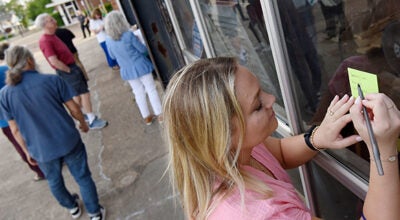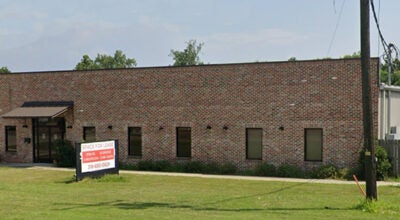Holy Family journeys through African American history
Published 12:01 am Monday, March 25, 2013

Dianne Good, center, raises her hand in affirmation while she and other choir members sing together during a performance of “Southern Road to Freedom” Saturday evening at Holy Family Catholic Church in Natchez. (Jay Sowers \ The Natchez Democrat)
NATCHEZ — The clapping, stomping, tambourine shakes, “amens” and “hallelujahs” heard during “Southern Road to Freedom” serve a deeper purpose than just entertaining the audience.
Each year during Pilgrimage the choir of Holy Family Catholic Church takes its audiences on a journey through the history of African-Americans in Natchez from slavery to today, the “Southern Road to Freedom.”
The story is mostly told through spirituals, hymns and gospel music, from “His Eye is on the Sparrow” and “I Need Thee” to “This Little Light of Mine” and “Amazing Grace.”
And choir members make sure they do their fair share of clapping, dancing and shaking.
That is because African-Americans in the past were sent to the backs and balconies of white churches to worship on Sundays in silence, narrator Charles Harris said.
“They could not worship with claps, instruments or ‘amens,’” he said.

Shemeka Ware sings for the gathered crowd during the performance. (Jay Sowers \ The Natchez Democrat)
Religion played a very vital part in the lives of slaves and freemen, Harris said. Their songs consoled and strengthened them through their time of captivity and oppression, he said.
Narration also educates the audience on the history of Rose Hill Missionary Baptist Church, the oldest organized black Baptist congregation in Mississippi, and Holy Family Catholic Church.
During the performance the choir members, dressed in traditional, brightly colored African clothing, also play the parts of various prominent African-Americans from Natchez’s past.
They tell the stories of Ibrahima, the African prince who was captured and sold into slavery in Natchez, Elizabeth Taylor Greenfield, a Natchez-born opera singer who eventually performed for Queen Victoria in 1854, Richard Wright, William Johnson and others.
Harris urges the audience to “listen quietly to the voices of the past.”
“No voice speaks as forcefully as the voice of Natchez,” he said.





